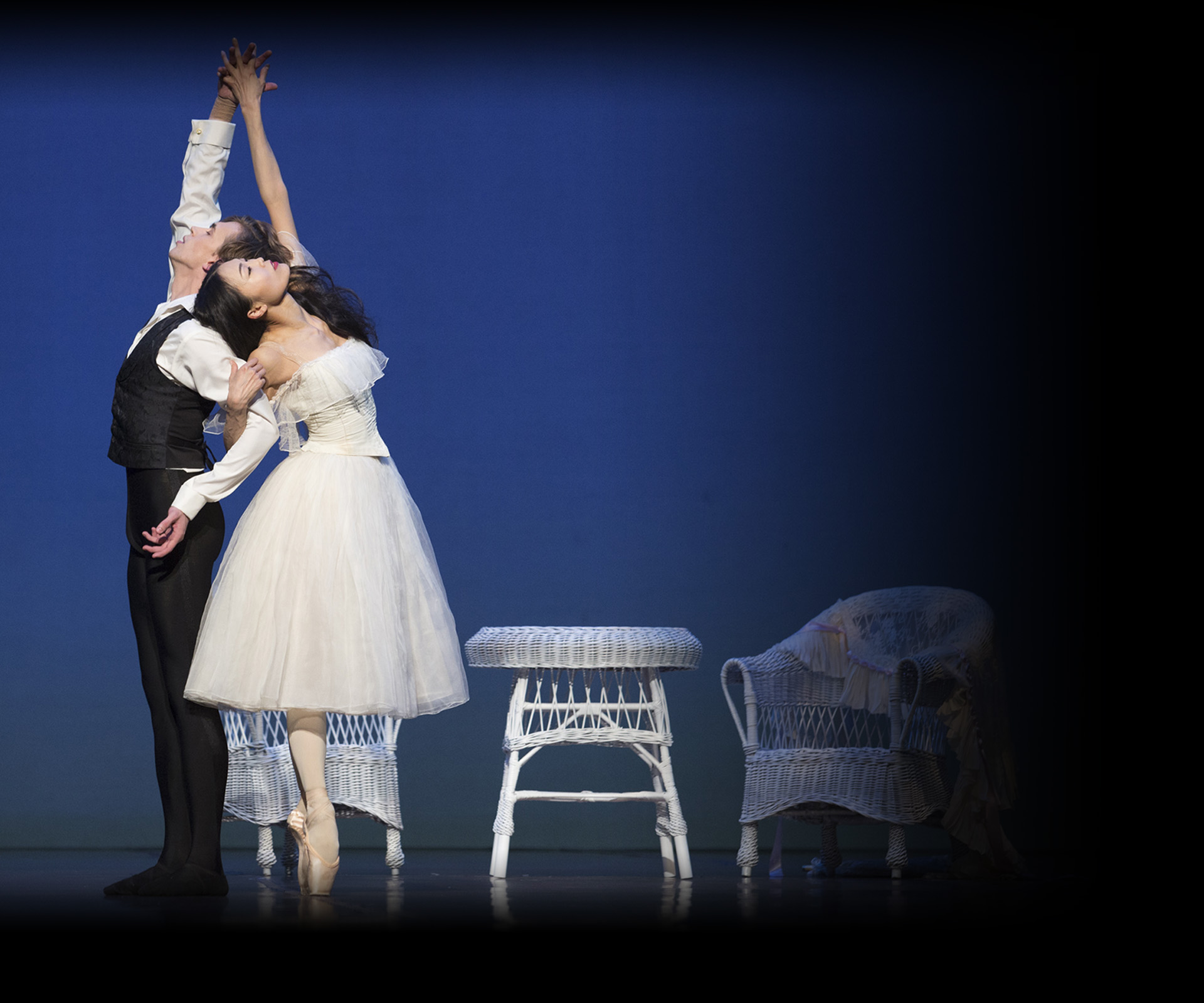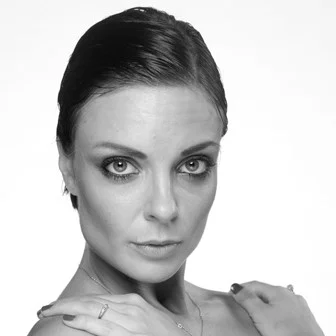The Lady of the Camellias
Fryderyk Chopin / John Neumeier
-
Act I
ca. 40 min.
-
Intermission
25 min.
-
Act II
ca. 40 min.
-
Intermission
25 min.
-
Act III
ca. 50 min.
-
Act I & II
1 h 30 min.
-
Intermission
25 min.
-
Act II
40 min.
-
Intermission
ca. 25 min.
-
Act III
1 h
Duration: ca. 3 hrs
-
Time is measured by
-

Cast
-
- Marguerite Gautier
- Armand Duval
- Monsieur Duval
- Nanina
- The Duke
- Prudence Duvernay
-
- Gaston Rieux
- Manon Lescaut
- Des Grieux
- Olympia
- Count N.
-
- Marguerite Gautier
- Armand Duval
- Monsieur Duval
- Nanina
- The Duke
- Prudence Duvernay
-
- Gaston Rieux
- Manon Lescaut
- Des Grieux
- Olympia
- Count N.
-
- Marguerite Gautier
- Armand Duval
-
Monsieur Duval
 Robert Bondara
Robert Bondara - Nanina
- The Duke
- Prudence Duvernay
-
- Gaston Rieux
- Manon Lescaut
- Des Grieux
- Olympia
- Count N.
-
- Marguerite Gautier
- Armand Duval
-
Monsieur Duval
 Robert Bondara
Robert Bondara - Nanina
- The Duke
- Prudence Duvernay
-
- Gaston Rieux
- Manon Lescaut
- Des Grieux
- Olympia
- Count N.
-
- Marguerite Gautier
- Armand Duval
- Monsieur Duval
- Nanina
- The Duke
- Prudence Duvernay
-
- Gaston Rieux
- Manon Lescaut
- Des Grieux
- Olympia
- Count N.
-
- Marguerite Gautier
- Armand Duval
- Monsieur Duval
- Nanina
- The Duke
- Prudence Duvernay
-
- Gaston Rieux
- Manon Lescaut
- Des Grieux
- Olympia
- Count N.
-
- Marguerite Gautier
- Armand Duval
-
Monsieur Duval
 Robert Bondara
Robert Bondara - Nanina
- The Duke
-
Prudence Duvernay
 Bianca Teixeira
Bianca Teixeira
(debuting in the role)
-
- Gaston Rieux
- Manon Lescaut
- Des Grieux
- Olympia
- Count N.
Credits
-
- Choreography
- Conductor
- Pianist
- Set and costume designer
- Lighting Conception
- Assistant choreographer
-
-
Music
 Fryderyk Chopin
Fryderyk Chopin
-
-
- Choreography
- Conductor
- Pianist
- Set and costume designer
- Lighting Conception
- Assistant choreographer
-
-
Music
 Fryderyk Chopin
Fryderyk Chopin
-
-
- Choreography
- Conductor
- Pianist
- Set and costume designer
- Lighting Conception
- Assistant choreographer
-
-
Music
 Fryderyk Chopin
Fryderyk Chopin
-
-
- Choreography
- Conductor
- Pianist
- Set and costume designer
- Lighting Conception
- Assistant choreographer
-
-
Music
 Fryderyk Chopin
Fryderyk Chopin
-
-
- Choreography
- Conductor
- Pianist
- Set and costume designer
- Lighting Conception
- Assistant choreographer
-
-
Music
 Fryderyk Chopin
Fryderyk Chopin
-
-
- Choreography
- Conductor
- Pianist
- Set and costume designer
- Lighting Conception
- Assistant choreographer
-
-
Music
 Fryderyk Chopin
Fryderyk Chopin
-
-
- Choreography
- Conductor
- Pianist
- Set and costume designer
- Lighting Conception
- Assistant choreographer
-
-
Music
 Fryderyk Chopin
Fryderyk Chopin
-
Ballet by John Neumeier in three acts with a prologue based on the novel by Alexandre Dumas, fils
Premiere: 4 November 1978, Stuttgart
Polish premiere: 20 April 2018, Teatr Wielki – Polish National Opera
For adults only
It is the autumn of 1844: Alexandre Dumas, the son of the famous author, takes on Paris and embarks on a turbulent love affair. It lasts for a brief time and ends in a split-up. And yet, it changes the life of the budding writer forever. She is the adored and influential Parisian courtesan, known as Marie Duplessis. Dumas, lovestruck, demands that she give up her profession for him. However, la Divine Marie, as her Parisian admirers dubbed her, does not want to give up her luxurious lifestyle. Soon she dies of tuberculosis. After her death Dumas immortalised the memory of his romantic love in La Dame aux Camélias, where he ennobled his former lover as Marguerite Gautier. One of the greatest choreographers of our time, John Neumeier, brings this story to the stage, and expresses its deep lyricism and tragic finale with Chopin’s music. This famous production has only appeared in the repertoire of a few companies in the world so far. Last season the Polish National Ballet joined this exclusive group.
Polish National Ballet
Orchestra of the Teatr Wielki – Polish National Opera
Synopsis
-
PROLOGUE
The ballet takes place during an auction. The story evolves as a series of memories recalled from various points of view — Armand’s, his Father’s and Marguerite’s.
(All actions during the auction are indicated in bold)
Marguerite Gautier, once the most desirable courtesan in Paris, has died. The complete furnishings of her luxurious apartment are to be disposed of by auction. Carrying Marguerite’s diary, Nanina, her loyal servant, bids the place farewell. Among those inspecting the items is Monsieur Duval, whose son Armand rushes in frantically. Overcome by memories, he collapses.
-
Act I
As Monsieur Duval comforts him, Armand tells his story.
It begins in the Théâtre des Variétés, during a performance of the ballet Manon Lescaut, in which the famous rococo courtesan deceives Des Grieux with numerous admirers. In the audience, Marguerite Gautier is disgusted by Manon’s frivolous in fidelity. Armand Duval, who has long admired Marguerite, is introduced to her by Gaston Rieux. Marguerite makes fun of Armand’s awkward sincerity. As he follows the ballet, Armand fears that his own future may reflect Des Grieux’s sorrowful fate.
After the performance Marguerite invites Armand to her apartment along with his friend Gaston, the courtesan Prudence and her own escort, the wearisome young Count N. Annoyed by the jealous Count, Marguerite suffers a coughing attack. Armand follows her to her bedroom, offers his assistance, then confesses his love. Marguerite is moved by his sincere passion. However, aware of her fatal illness and needing the comfort of luxury, she insists that their affair must remain secret.
While Marguerite continues to lead her hectic life, hastening from one ball to another, from one admirer to the next, from an old Duke to the young Count, Armand is always there — waiting. When Marguerite departs for the idyllic country house the Duke had put at her disposal — he follows her.
-
Act II
Marguerite’s summer straw hat prompts Armand to resume his story...
Surrounded by revealing friends and ardent admirers, Marguerite continues her turbulent life in the country.
With the inevitable confrontation between Armand and the Duke, Marguerite’s moment of decision arrives. She publicly acknowledges her love for Armand. Armand and Marguerite are alone at last.
Armand’s father recalls with regret his part in the story.
Ashamed that his son is living with a prostitute, Monsieur Duval visits Marguerite in the country. He insists that her relationship with his son will ruin Armand. Shocked, Marguerite protests, but the image of Manon and her admirers appear in memory, a mirror image of her own past, confirming the truth of Monsieur Duval’s accusations. He demands that she leave Armand. Out of deep and sincere love Marguerite complies.
Armand tells his father how he found the house deserted.
He waited in vain until Nanina brought him a letter saying that Marguerite had returned to her former life. Unbelieving, Armand runs to Paris, finding Marguerite in the arms of the Duke.
-
Act III
Armand explains to his father how they met later on the Champs-Élysées.
Marguerite was accompanied by the beautiful young courtesan Olympia. To have his revenge on the woman who had so deeply wounded him, Armand flirts with and seduces Olympia.
Deathly ill, Marguerite visits Armand, begging him not to hurt her by flaunting his affair with Olympia. Their passion ignites once more. Falling asleep, a vision of her alter ego Manon beckons Marguerite back to her former life. Waking, she remembers her promise to his father and silently leaves Armand for the second time At a grand ball, Armand publicly humiliates Marguerite by handing her money as payment for past services. Marguerite collapses.
Armand has reached the end of his story. He will never see Marguerite again. Deeply moved, his father leaves, as Nanina returns and gives Armand Marguerite’s diary.
Reading, Armand seems to accompany Marguerite on her last visit to the theatre. Again, she views a scene from the ballet Manon Lescaut. This time it is one in which Manon, impoverished like herself, dies in the arms of her faithful lover Des Grieux.
Ill and despairing, Marguerite leaves the theatre, but the characters from the ballet follow her into a feverish dream. As the phantom lovers blend with her own memories, her identification with Manon seems complete. Deserted and longing to see Armand again, Marguerite confides her last thoughts to the diary, which she gives to Nanina for Armand.
Marguerite dies alone.
Armand silently closes her diary.
Sponsors
-
Mecenas Teatru Wielkiego - Opery Narodowej
-
Partnerzy Teatru Wielkiego - Opery Narodowej
-
Partner Polskiego Baletu Narodowego
-
Patroni medialni
-
Patron of Teatr Wielki – Polish National Opera
-
Partners of Teatr Wielki – Polish National Opera
-
Partner Polskiego Baletu Narodowego






 Yuka Ebihara
Yuka Ebihara  Patryk Walczak
Patryk Walczak  Wojciech Ślęzak
Wojciech Ślęzak  Joanna Drabik
Joanna Drabik ![[Translate to English:]](/fileadmin/import/uploads/tx_news/Carlos_Martin_Perez_new_02.jpg) Carlos Martín Pérez
Carlos Martín Pérez  Marta Fiedler
Marta Fiedler ![[Translate to English:] Maksim Woitiul](/fileadmin/_processed_/3/c/csm_maksim_woitiul_www_mini_45f943f354.jpg) Maksim Woitiul
Maksim Woitiul  Chinara Alizade
Chinara Alizade ![[Translate to English:] Dawid Trzensimiech](/fileadmin/_processed_/a/8/csm_Dawid_Trzensimiech_www_mini__fot._Ewa_Krasucka_2888-BW_7b1c0dc642.jpg) Dawid Trzensimiech
Dawid Trzensimiech  Mai Kageyama
Mai Kageyama  Adam Myśliński
Adam Myśliński  Kristóf Szabó
Kristóf Szabó  Palina Rusetskaya
Palina Rusetskaya  Paweł Koncewoj
Paweł Koncewoj  Yurika Kitano
Yurika Kitano  Melissa Abel
Melissa Abel ![[Translate to English:]](/fileadmin/_processed_/5/9/csm_Bartosz_Zysk_IMG_9055-Edit_-_2025_5eca535a9e.jpg) Bartosz Zyśk
Bartosz Zyśk Rinaldo Venuti
Rinaldo Venuti ![[Translate to English:]](/fileadmin/import/media/img/ludzie/tancerze/medium/Vladimir_Yaroshenko_2024_-_kwadrat.jpg) Vladimir Yaroshenko
Vladimir Yaroshenko![[Translate to English:]](/fileadmin/_processed_/e/a/csm_John_Neumeier_neu__c__Kiran_West__370_13c7974c06.jpg) John Neumeier
John Neumeier  Grzegorz Nowak
Grzegorz Nowak  Krzysztof Jabłoński
Krzysztof Jabłoński  Marek Bracha
Marek Bracha  Jürgen Rose
Jürgen Rose  Kevin Haigen
Kevin Haigen  Janusz Mazoń
Janusz Mazoń  Radik Zaripov
Radik Zaripov 





